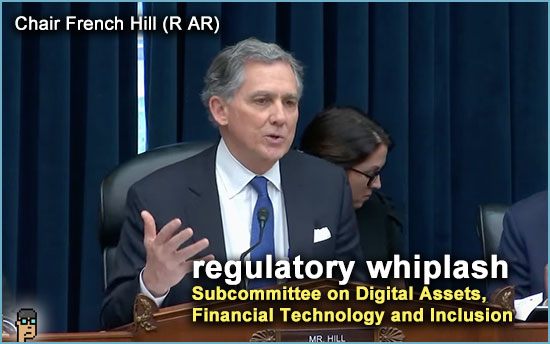The House Financial Services (HFS) Subcommittee on Digital Assets, Financial Technology and Inclusion gathered yesterday to consider the role of the Financial Stability Oversight Council (FSOC) in overseeing innovative technologies. Chair French Hill (R, AR) and Ranking Member Stephen Lynch (D, MA) presided.
The hearing’s title was “Regulatory Whiplash: Examining the Impact of FSOC’s Ever-Changing Designation Framework on Innovation” and reflected the skeptical view held by the Committee’s majority Republicans, and some Democrats, on the role of FSOC in regulation.
If you’re a nonbank entity in crypto offering some form of a bank’s functions, this hearing was for you.
In fact, from the prepared testimony of the witnesses, digital assets was top of mind along with AI and climate change when it comes to regulation and FSOC – which was established in 2010 by Dodd-Frank after the Great Financial Crisis. See hearing video.
Get witness testimony here:
-
- Jeffrey Dinwoodie, Partner, Cravath, Swaine & Moore
- Bill Hulse, SVP, U.S. Chamber of Commerce
- Ji Kim, General Counsel, Crypto Council for Innovation (CCI)
- Paul Kupiec, Senior Fellow, American Enterprise Institute (AEI)
- Amias Gerety, Partner, QED Investors
Among the highlights of the prepared testimony, AEI’s Kupiec hinted at the main theme proffered by Republicans in the hearing: “Congress should reassert its authority and limit the FSOC’s ability to use its ‘systemic risk’ powers to advance a political agenda.” – i.e. the party of the chief executive in the White House.
Nevertheless, back in 2022, in response to President Joseph Biden’s Executive Order on Digital Assets, FSOC produced its opinion on regulation: “Report on Digital Asset Financial Stability Risks and Regulation.” Get it here. At the time, Janet Yellen addressed Congress in a statement, “This report provides a strong foundation for policymakers as we work to mitigate the financial stability risks of digital assets while realizing the potential benefits of innovation.” Continue reading “Digital Assets And The Systemically Important Financial Institution – SIFI – Designation”


